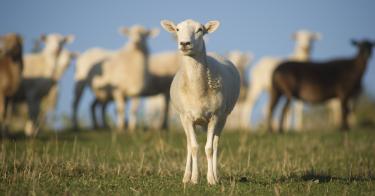“People of the same trade seldom meet together, even for merriment and diversion, but the conversation ends in a conspiracy against the public, or in some contrivance to raise prices,” wrote Adam Smith in 1776. That’s why it’s unsurprising that the cattle industry association R-Calf USA has a petition calling for tariffs on Australian and New Zealand sheep products.
The proposed tariffs would violate the free-trade agreement (FTA) between the United States and Australia. It has no chance of succeeding against Australia and would also raise lamb prices for American consumers. The petition makes baseless claims that Australia has inferior environmental and production standards despite Australia’s very stringent standards.
American lamb is expensive because the U.S. government has restricted poisonous bait for predators, disastrously affecting the domestic sheep population. Sheep farmers can blame their government and the environmental lobby for prioritizing the welfare of coyotes and foxes over ranchers and sheep.
>>> Using Trade to Safeguard America’s Independence
As the petition states, “The use of sodium fluoroacetate (compound 1080), a chemical compound once widely and effectively used as a poisonous bait in the United States by the sheep industry to control predators and thus reduce predation, was prohibited in 1972 (by the EPA) and later reauthorized with severe restriction in 1985.”
According to Meat & Livestock Australia:
Lethal baiting is considered to be the most effective available method of controlling foxes and is cost effective over large areas. Ground baiting tends to be more effective and has a decreased risk of baiting non-target species than aerial baiting. There are strict restrictions on the availability and use of 1080 and persons using 1080 must ensure they meet appropriate state requirements and follow instructions.
If R-Calf USA felt they had a genuine legal dispute against Australian entities, they could seek to resolve their dispute through consultation as called for by Article 21.5 of the U.S.-Australia FTA. Failing that, according to Article 21.7, “where consultations are not effective in resolving a dispute, the Agreement provides for an arbitral panel to consider the matter.”
This option has been available since 2005, but the trade association has chosen not to pursue it because they are on weak legal ground. Instead, R-Calf USA has misrepresented the situation to Hill staffers and Members of Congress while obscuring the existence of the FTA and its parameters.
The petition presents a distorted view of free-trade agreements in general and even makes erroneous claims about other FTAs, such as NAFTA.
Instead of attacking popular imports from our closest allies, R-Calf USA should encourage the American sheep industry to innovate and lobby for changes to regulations concerning the necessary culling of predators of American sheep.
R-Calf USA should recognize that the Biden administration is no friend of animal farming. The extreme environmental and Net Zero policies that have taken hold in the West are declaring war on everything from sheep and cattle to fossil fuels. If the Net Zero extremists get their way, they will cull all sheep and cattle to achieve their unobtainable targets.
The Biden administration is now attacking agriculture in this new green war, following the examples of the Netherlands and Belgium. Biden’s Special Envoy for Climate, John Kerry, said concerning Net Zero at the U.S. Department for Agriculture, “We don’t get this job done unless agriculture is front and center as part of the solution.” The attack on emissions is taking its toll on food.
The Australian and New Zealand agricultural interests have been far more resourceful in capturing foreign markets for their sheep products. For example, lamb is a favored food product in Muslim-majority countries. Australia and New Zealand have effectively produced Halal-compliant food products in these markets. American producers could learn from this example, innovate, and compete in the international export market.
>>> How Washington’s $7.5 Trillion Deficit Spending Spree Is Bankrupting America
Regulations, inefficiency, and a lack of innovation and infrastructure are miring the U.S. sheep industry. Australia and New Zealand, two of our closest allies, should not be blamed for these failures, especially when we need their cooperation in national security matters relating to Chinese aggression, as exemplified in the recent AUKUS agreement.
Most importantly, the petition is correct to highlight the harmful effects of inflation on the U.S. sheep industry and the increased price of American sheep products. But blame for that should be leveled squarely at the Biden administration’s reckless overspending that has caused the inflation and the complacency of the Federal Reserve Board of Governors Chairman Jerome Powell, who declared that inflation was transitory.
Inflation hit a forty-year high in 2022, affecting all businesses and shoppers. The production-cost spikes, including nearly a 23 percent increase in fuel costs and a 13.5 percent increase in feed costs during 2021, have burdened sheep producers with mounting expenses. You can’t blame Australia and New Zealand for that, but you should blame Joe Biden.
Merchants always incentivize blocking competition to keep prices high and stifle innovation, but Congress should not fall for this petition. In these inflationary times, Americans need low-cost meat. Both trade policy and regulatory changes can help them get it.
This piece originally appeared in The National Interest https://nationalinterest.org/blog/livestock-industry%E2%80%99s-beef-biden-not-australia-206836



